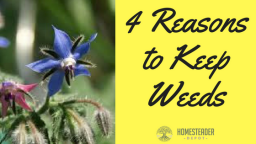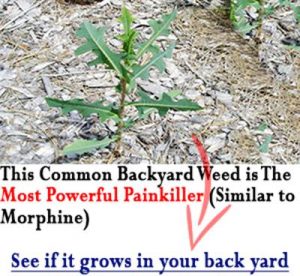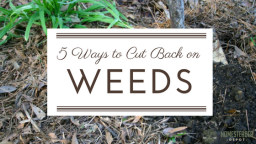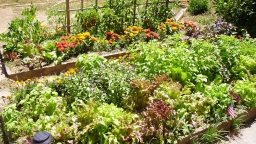Any serious gardener puts one thing at the top of their list when it comes to gardening headaches: weeds! What if I told you that it doesn’t have to be this way? The first step in conquering your weed problem is to change your mindset! Here are four compelling reasons to rethink the role of weeds in your homestead:
Reason #1, They’re The Easiest “Superfood” You Can Grow!
Have you ever heard of a variety of “super spinach” that didn’t bolt at the first sign of heat, had 4% of your recommended protein requirements and blew the calcium content of chard and regular spinach out of the water? Gotcha! I’m talking about lambsquarters, an incredibly common and hardy “weed”. What about another salad green that is bursting with omega 3 fatty acids and even more beta carotene than those carrots you lovingly tend to? It’s purslane, and you’ve probably been ripping it out of your garden for years! Both of these common weeds can be used fresh or in myriad delicious recipes, so leave them be!
Reason #2, Attracting Beneficial Insects
A bee doesn’t care if a flower was intentionally planted or wild. Other beneficial insects such as ladybugs, tachnid flies, hoverflies, parasitic wasps and lacewings use wild plants for food and shelter. Weeds also act as “bait” for prey insects such as aphids. This may not sound great, but wouldn’t you rather have aphids munching on weeds than your tomatoes? Plus, they won’t be munching for long before the ladybugs come around! A garden without a thriving ecosystem of insects is not healthy. If plants are healthy and vigorously growing, a little nibble here and there won’t be a problem. Here are just a few plants that attract beneficial insects:
Alfalfa
Butter and Eggs
Clover
Dandelion
Goldenrod
Tansy
Yarrow
Reason #3, They’re A Natural “Green Manure”
Research shows weeds to be “dynamic nutrient accumulators”. This means that these plants shoot roots deep into the ground and pull up nutrients that they accumulate in their leaves. When they lose their foliage in the fall, the nutrients build up in the topsoil, making an instant fertilizer. So, if you see the following weeds in your garden, leave them alone and let them do their job:
Borage
Chickweed
Chicory
Clovers
Dandelion
German Chamomile
Lambsquarters
Lemon Balm
Common Mullein
Mustards
Nettles
Peppermint
Red Root Pigweed
Plantains
Purslane
Shepherd’s Purse
Thistle
Yarrow
Reason #4, Wild Plants Can Be Potent Medicines
Stung by a bee? Chew a plantain leaf and apply it like a band-aid. Wild plants can be used for anything from seasonal allergies to an upset stomach. Many of the plants we consider to be “weeds” were carefully introduced to this land by earlier settlers to be used as food and medicine because there was no drugstore or doctor’s office. Back then, you had to and knew how to, harvest wild plants for medicine. Those were the days!
The next time you’re in the garden, start thinking about weeds as “resources” or “volunteers” instead of pests. To keep their population under control, you can nip in the bud or harvest regularly. Pick them before they go to seed to keep them from dominating your garden. Just like in life, it’s all about striking a balance!



